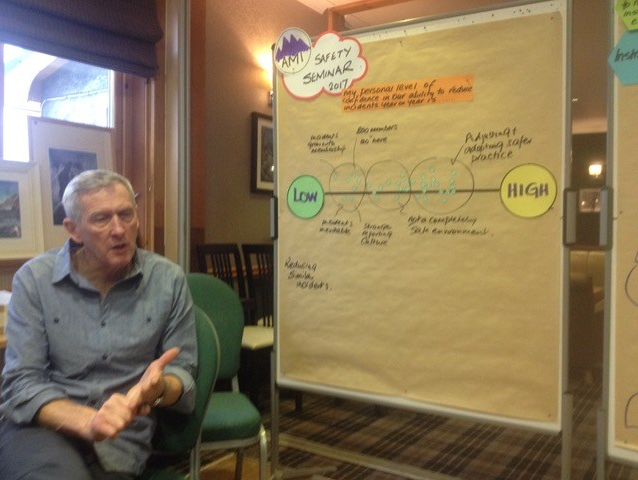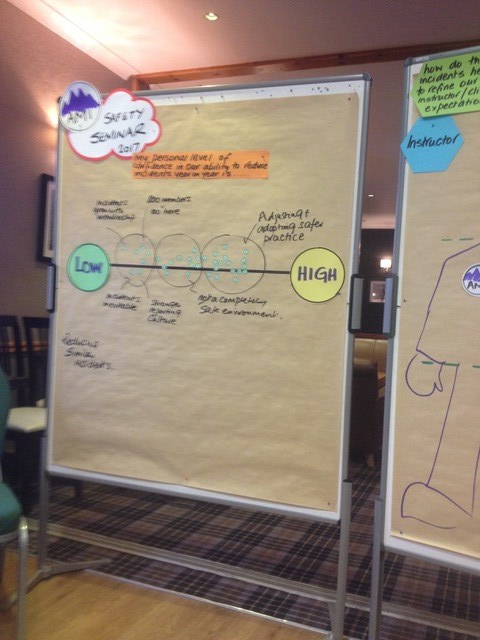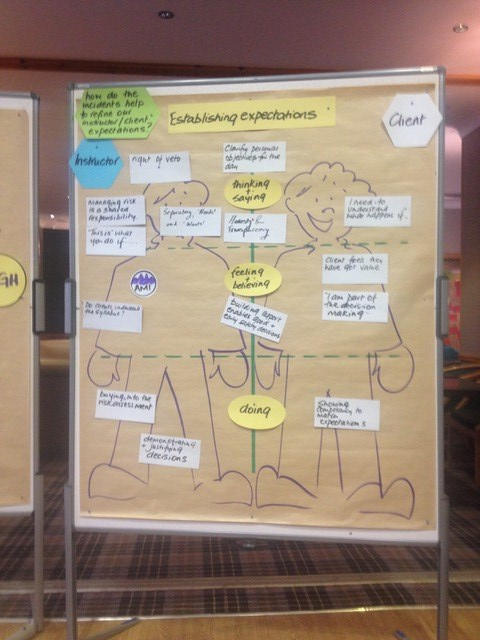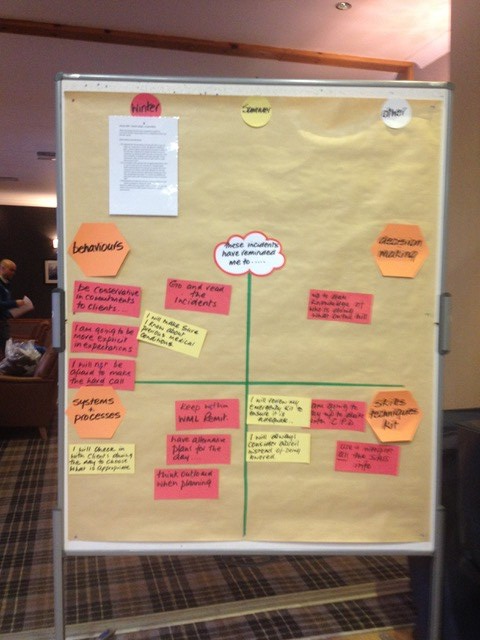AMI Safety Seminar, AMI AGM WEEKEND 2017
Having had my chosen workshop cancelled just a couple of days earlier it was with some reluctance I went along to the dry sounding Safety Seminar. However when I saw that the Silver Fox that is Steve Howe was presenting it I was somewhat re-assured!

Steve gave us a brief outline of the current procedure for reporting incidents and the possible sanctions that could be imposed for unprofessional practice. However for reasons expanded on later it was emphasised that sanctions were unlikely. He decided to provoke us with a starter; asking us to place on a scale from Low to High our response to the statement ‘ My personal level of confidence in our (AMI’s) ability to reduce the level of incidents year on year is……………..’ and unsurprisingly there were a range of responses. Those at the low end of the scale said we were working in an environment with objective dangers and therefore it was impossible to keep reducing incidents. Additionally our membership is increasing and our willingness to report incidents is improving, both of which would lead to an increase in recorded incidents. At the other end of the scale folk felt that the willingness of the membership to self-reflect and critically examine their practice was improving and therefore incidents should reduce. I had certainly got a positive impression on this from my discussions with members, though it was pointed out though that there were around 100 at the weekend from a membership of over 900.
What was made clear is that for incidents to reduce it is essential the membership are encouraged to self-reflect and adjust their practice accordingly. The CPD requirement had been useful in kick-starting this but we needed to look for ways to keep moving it forward. For example, within the teaching profession there is now a requirement to record self-reflection in a CPD log. As well as recording specific courses and CPD events, teachers have to reflect on the impact of what they had learnt and how they would apply it to their current practice.
The next section involved splitting into smaller groups and looking at some of the incidents that had been reported, with anonymity being preserved. It was very hard to not be judgemental over these, but Steve and the group leaders gently guided us towards using the incidents to think about how we might change our practice in the light of what had happened in the incident. We posted suggestions under four headings: Behaviour; Decision Making, Systems & Processes and Skills/Techniques/Kit. A lot of useful discussion took place and I think that everyone took away ideas to immediately change their current practice for the better. If nothing else, many of us were motivated to go away and read the incident log regularly, having not fully appreciated the wealth of useful information that could be gleaned from it. It was therefore clear that all should be done to encourage members to report not only incidents, but also near misses and all agreed that a judgemental process, or one based on sanctions would not be helpful in this.
We then drew together the various threads of our discussions to look at the processes involved in establishing the expectations between Client and Instructor. It was clear that the discussions that took place prior to heading out on the hill were an important factor in ensuring a safe day out. By involving clients in the decision making and making it clear from the outset that the objectives of the day were fluid and dependent on factors such as weather and snow conditions, there would be less pressure to press on with objectives regardless. As one person said ‘we need to be instructors, not guides’.
Finally Steve got us to look at the current Incident Reporting process and the form itself. A number of suggestions were made for improving the form and, given that reporting was required within 48 hours, care had to be taken to ensure that information recorded would not affect any outside investigation, should that be required. The reporting of near misses was felt to be something that rarely took place and there was a consensus that the form needed to be user friendly for this.
There was a strong feeling at the end of the session from all involved that this had been a really helpful process. Through the seminar we had all had to examine our own practices and we left
with practical ideas to immediately improve and develop these. Guy asked us if we felt that running similar seminars was something that should be rolled out to the regions and all supported this.
My thanks go to Steve for guiding us through a potential minefield in such a positive and supportive way. I left the seminar thankful that my workshop had been cancelled, as this was something I really wouldn’t have wanted to miss!
Tony Gabb


